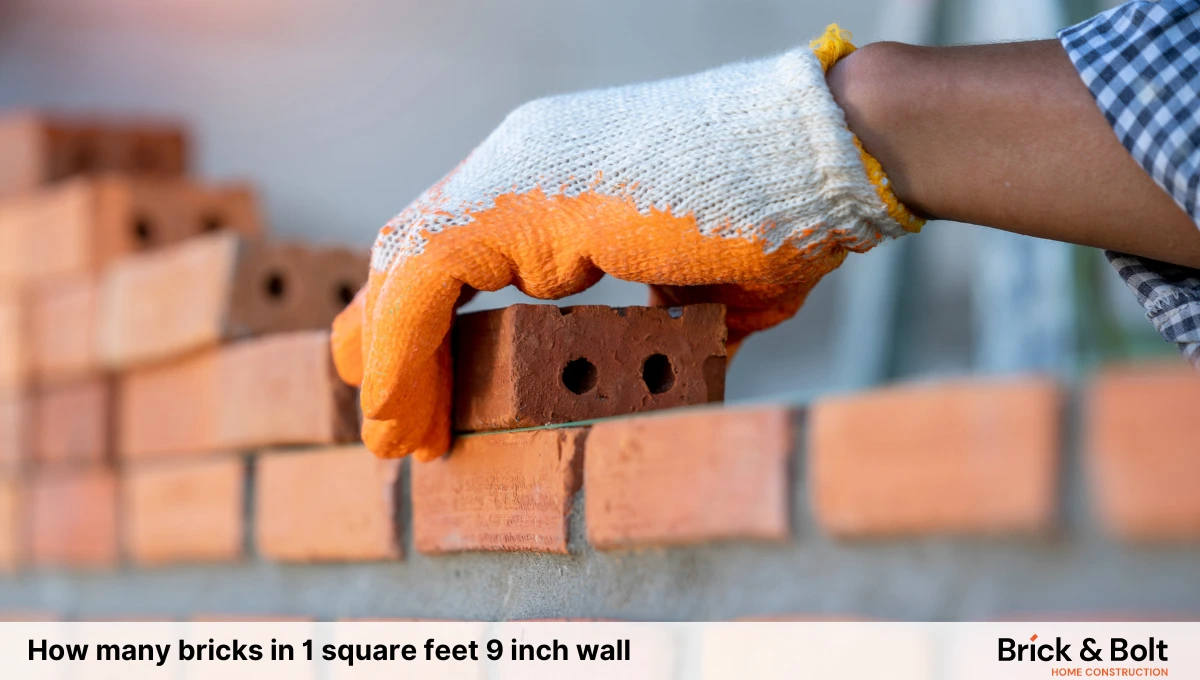Accurate estimation of brick requirements for a construction project is crucial for effective planning and budgeting. It is a primary raw material that allows for informed decisions in different aspects. Unfortunately, many homeowners and builders are struggling to determine the brick count accurately for a square foot or specific wall area.
Before diving into the wider calculation, the estimation per square foot eases the job. This blog aims to provide practical tips for real-world applications. With consideration of important factors, we explain to you how many bricks are required for 1 square foot of a 9-inch thick wall.
Number of Bricks in a 1 sq. ft., 9-Inch Wall
To determine the number of bricks required for a 1 sq. ft., 9-inch wall, follow these simple steps:
Find the Brick Dimension
As an initial step, determine the length, width, and height of the specific brick. It may vary between regions and countries. For consideration, we’ll take the Indian standard brick size:
Brick size = 190 x 90 x 90 mm
Mortar thickness = 12 mm
Calculate the Total Volume of Brick Work on a 9 Inch Wall
Use this formula to calculate the volume of brickwork:
Volume (cubic feet) = Area (sq. ft) x Thickness (feet)
Since the area is given in square feet whereas the thickness is 9 inches, you need to convert the thickness to feet.
Thickness (feet) = 9 inches / 12 inches per foot = 0.75 feet
Now, use this thickness (feet) to determine the brickwork volume.
Brickwork volume = 1 sq. ft. x 0.75 feet = 0.75 cubic feet.
Find the Volume of One Brick Without Mortar
Calculate the volume of one brick without mortar by multiplying the length, width, and height of the brick.
Length x width x height = 190 mm x 90 mm x 90 mm = 15,39,000 mm3, or 0.05438 cubic feet.
Calculate the Volume of Each Brick with Mortar
As mentioned, the thickness of the mortar is 12mm
Volume of one brick with mortar = length x width x height = 202 mm x 102 mm x 102 mm = 21,01,608 mm3, or 0.07422 cubic feet.
Note: In this formula, the mortar thickness is added to the length, width, and height of the brick.
Calculate No. of Bricks for 1 Sq.ft., 9 Inch Wall
Number of bricks = total volume of brickwork / volume of each brick
= 0.75 cubic feet / 0.07422 cubic feet
= 10.12
So, we need 10 bricks for a 1 sq. ft., 9 inch wall.
Factors Affecting Brick Quantity
Brick calculation is easy, but it can be influenced by certain significant factors, as explained in the following. These parameters must be considered for an accurate estimation:
Types of Bricks:
You can find a wide array of brick types on the market today. Based on your selection, the calculations may vary. For instance: Compared to solid bricks, hollow bricks are generally larger and consume fewer bricks per square foot. The size and weight-bearing capacity impact the brick count. If you are using different brick sizes in your construction, adjust the calculations accordingly.
Wall Openings:
Doors and windows are essential variables in all construction projects. It reduces the wall area, resulting in a lower brick count. Before diving into the brick calculations, ensure the area of the larger openings for accurate estimation.
Brick Wastage:
Brick damages are unavoidable during construction. There is a chance for 5 to 10% of brick wastage; hence, the overestimation helps to compensate for the losses. It is always advisable to order slightly more bricks to avoid project delays.
Design Consideration:
Bricks are available in different patterns and sizes to elevate the elegance of buildings. Each has its unique properties and benefits (examples include the Flemish bond and the English bond). According to your selection, the final brick count can vary. The area might require additional bricks to achieve perfect cutting and fitting.
Final Wordings
I hope you got the answer along with a calculation method for how many bricks are required for a 1 square foot, 9-inch wall. You can use the same method to determine the brick count of all construction projects. However, you should be aware of some important considerations that can directly influence the final brick count, including brick type, design considerations, and waste. By following the steps mentioned in this guide, you can accurately predict the brick quantity appropriate to your construction needs.
FAQs
Thicker mortar joints affect the area covered by each brick. It increases the number of bricks required for a specific area. For example, a mortar joint with a thickness of ¼ inch requires more brick count than a 3/8 inch thickness.
The cost of brick is not the same in all regions. It can significantly vary due to quality, market conditions, brick type, and location. It is highly recommended that you get quotes from your local manufacturers or suppliers for accurate pricing.
Yes, the basic calculation method is the same, but the final brick count can vary based on the brick type. For example, hollow bricks, which are comparatively larger than solid bricks, might require fewer bricks per square foot.
As per the BIS guidelines, the standard size of a brick in India is 190 mm x 90 mm x 90 mm (length x width x height). However, the dimensions can vary according to the type of brick and region.
Yes, it is necessary to consider the brick wastage during construction. Add 5 to 10% to the final brick quantity to compensate for the broken or damaged bricks and avoid project delays.

